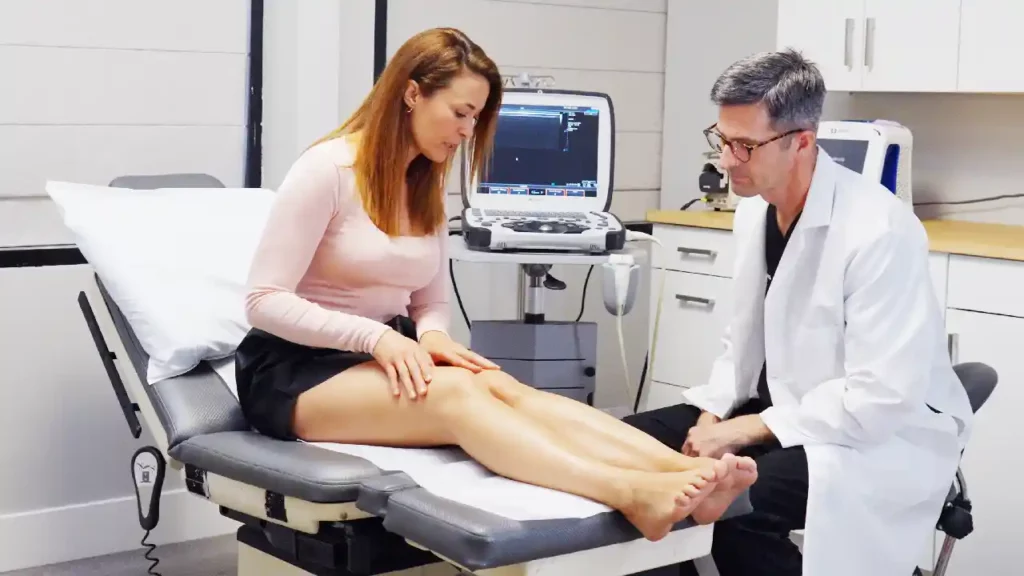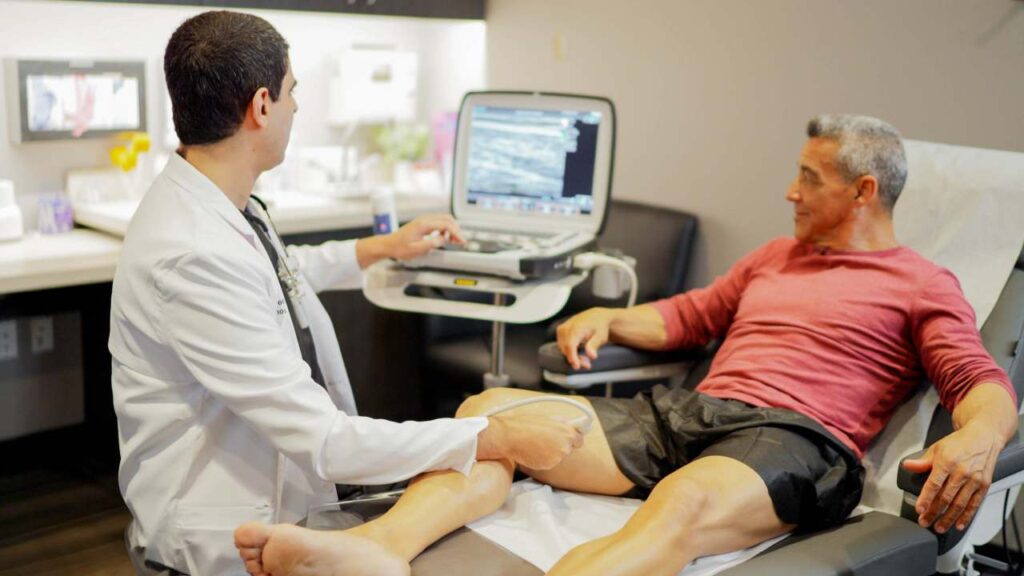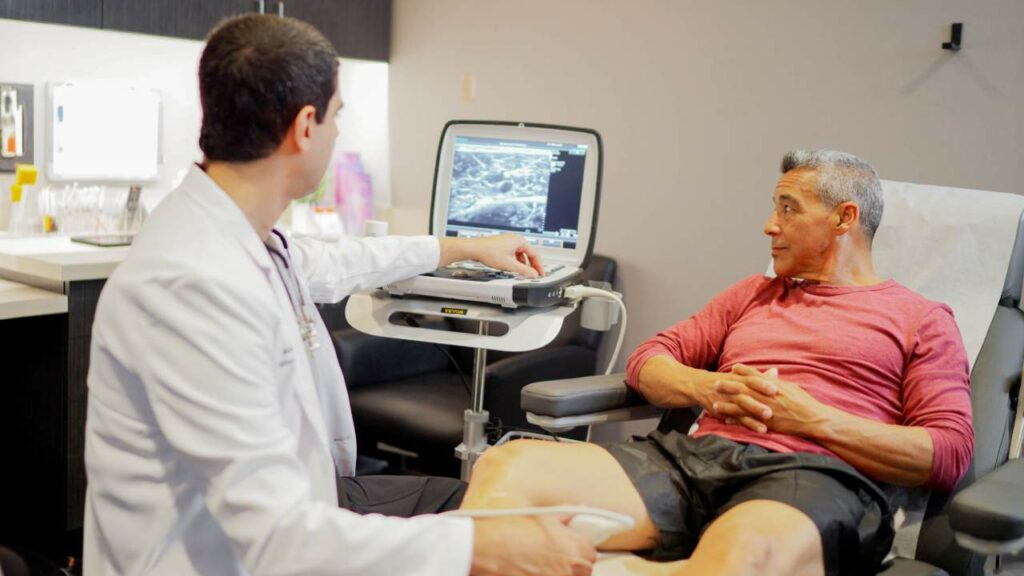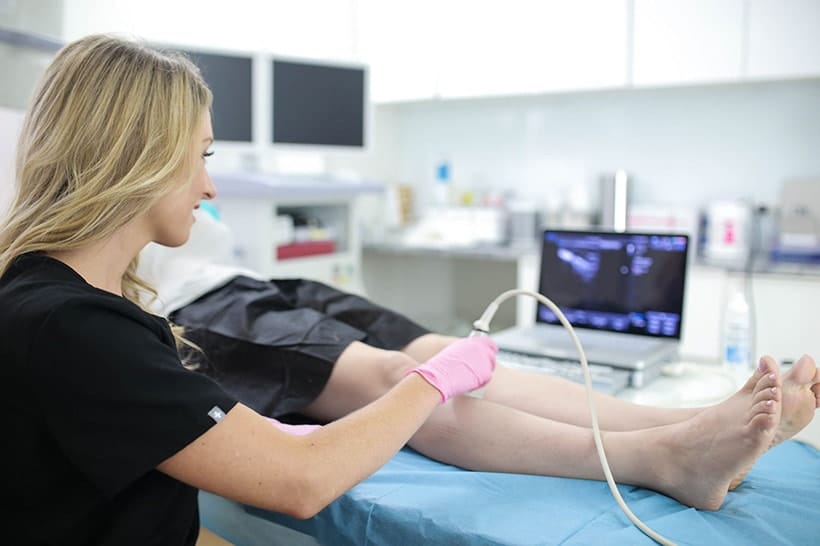What Makes a Vein Stretch and Protrude During Pregnancy?
Pregnancy is a common time to develop varicose veins. That’s because multiple things about pregnancy influence the size of your veins. Book an appointment with our California vein doctors to learn how to prevent and treat varicose veins caused by pregnancy. One reason varicose veins and pregnancy coincide is the doubled blood volume in your veins. Blood increases to supply the fetus. Veins must stretch to accommodate that. Veins are lined with little valves that close once blood flows through, to keep it flowing in the right direction. When veins stretch, it’s harder for valves to seal tightly, so blood leaks backward through the vein. This causes engorgement, which produces those twisted, swollen varicose veins you see at the skin’s surface.
Another reason women develop varicose veins during pregnancy is that hormone fluctuations influence the size of blood vessels. Pregnancy, birth control usage, hormone replacement therapy, and pregnancy all increase the incidence of varicose veins. This explains why varicosities are more common in women than men.
A third reason varicose veins occur while pregnant is the extra weight pregnant women carry. Weight gain burdens veins, especially veins in the lower extremities that bear weight and resist gravity while pumping blood up to the heart. This is also the reason that varicose veins are more common in overweight individuals. Weight gain is healthy and necessary during pregnancy, so talk to your vein doctor about minimizing your varicose vein risk.
A fourth reason for varicose veins forming while pregnant is the expanding uterus. As your fetus grows, the uterus can put pressure on adjacent pelvic veins, which can cause venous engorgement or venous reflux. The good news about pelvic pressure, hormone fluctuations, increased blood volume, and weight gain, is that all of these improve after pregnancy. So, some women’s varicose veins improve or even disappear after delivery. For those that don’t, treatment is quick and easy. You’ll learn more about that below.
What Causes Distended Veins in the Legs and Groin?
During pregnancy, the most common reason for distended veins in the legs is weight gain or backward blood flow through the veins. This occurs when a valve fails to close (often because the vein has stretched to accommodate extra blood volume). Vulvar varicosities (purple vagina veins on the labia) and swollen veins in the groin can have all the same causes as varicose veins in other areas. But groin veins are particularly susceptible to becoming varicose as the uterus enlarges. Vulvar veins are also susceptible to changes from shifting hormones.
What Causes Varicose Veins on Buttocks?
Varicose veins on the buttocks stem from venous reflux, weight gain, hormones, or sedentary lifestyles. Some women have to go on bed rest, or at least stay off their feet for a while. This makes it harder for blood to flow from the feet to the heart. Veins rely on leg and buttock muscles to contract to help return blood to the heart. When we’re forced to be inactive, blood can accumulate in the vein, causing varicosities. Talk to our Harvard-trained vein doctors about preventing this complication. If you’re on bed rest, call our office to inquire about telehealth services.
What Causes Varicose Veins in the Rectum?
Bulging veins in the rectum can occur with any of the causes we’ve mentioned. But some swollen veins in the rectum, called hemorrhoids, can result from a common complication of pregnancy, which is constipation. When people strain for a bowel movement, veins inside the rectum swell. They can bleed, itch, or be painful. These are similar to varicose veins, but they require different treatments. Medicated creams, sitz baths, eating fiber, rubber banding, and surgery can relieve hemorrhoids. These treatments don’t work for other types of varicose veins.
Are Varicose Veins in Anus and Buttock the Same?
Bulging veins in the buttocks versus the anus in pregnancy aren’t always the same issue. External buttock veins that protrude are often varicose veins. Internal veins in the anus are often hemorrhoids. Both can result from pressure, or from sitting or standing for long periods. But they also have different causes and solutions. Varicose veins might relent after pregnancy, but if not, they might require compression therapy or minimally invasive vein treatment. Doctors can inject sclerosants or adhesives or apply thermal energy to eliminate varicose veins. These treatments are non-surgical and don’t require general anesthesia, recovery time, or hospitalization.
Are All Prominent Veins Varicosities?
Veins are designed to stretch and shrink to accommodate fluctuations in blood volume. For instance, if you take a hot shower, or do a strenuous workout, your veins will enlarge as your heart rate increases. They’ll naturally reduce in size once your blood pressure lowers. So, some prominent veins are not varicose. This is particularly true during pregnancy when veins are forced to stretch.
The best way to know if a vein is varicose is to see a vein doctor. Bulging veins can sometimes signify a blood clot in deep veins or vein diseases. So, don’t try to self-diagnose. In addition, if the vein is larger and more twisted than those around it, and it remains enlarged at all times, it’s more likely to be varicose. See a vein doctor for advice.
Should I Treat Varicose Veins on Butt or Leg When Pregnant?
Unless the varicosity presents an emergency complication, like profuse bleeding, blood clots, or deep vein thrombosis (DVT), it’s best to wait until after delivery for treatment. Minimally invasive vein treatments are FDA-approved and safe for patients. But they’re either injected into the vein, or applied to the vein’s walls, and the fetus is supplied by the same veins. There hasn’t been adequate testing on vein treatments entering the circulatory system during pregnancy.
So, come see us for your assessment now. We’ll discuss symptom relief while pregnant, and answer common questions, like whether it’s okay to wear tight clothes or cross your legs with varicose veins. Then we’ll select the right vein treatment for you, and book you for after your delivery. We look forward to meeting you!






